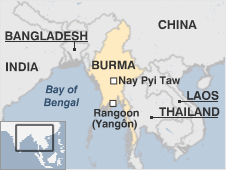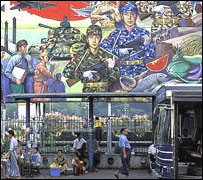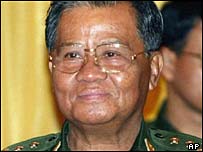 |
The generals and the army stand accused of gross human rights abuses including the forcible relocation of civilians and the widespread use of forced labour which includes children.
Overview
A popular uprising was forcibly crushed in 1988 and mass demonstrations were not seen again until 2007 when a small string of protests about living standards gained momentum among a public normally too cowed to voice any dissent.
AT-A-GLANCE
 Politics: Burma has been under military rule since 1962; the regime stifles almost all dissent
Economy: Burma is one of Asia's poorest countries; its economy is riddled with corruption
International: Burma is seen as a pariah state by the West which maintains sanctions; China is its main ally
|
Prominent pro-democracy leader and Nobel Peace Prize winner Aung San Suu Kyi has had various restrictions placed on her activities since the late 1980s.
Her party the National League for Democracy won a landslide victory in 1990 in Burma's first multi-party elections for 30 years but has never been allowed to govern.
Military-run enterprises control key industries and corruption and severe mismanagement are the hallmarks of a black-market-riven economy.
The armed forces - and former rebels co-opted by the government - have been accused of large-scale trafficking in heroin of which Burma is a major exporter.
The largest group is the Burman people who are ethnically related to the Tibetans and the Chinese. Burman dominance over Karen Shan Rakhine Mon Chin Kachin and other minorities has been the source of considerable ethnic tension and has fuelled intermittent separatist rebellions.
Military offensives against insurgents have uprooted many thousands of civilians.
A largely rural densely forested country Burma is the world's largest exporter of teak and a principal source of jade pearls rubies and sapphires. It is endowed with extremely fertile soil and has important offshore oil and gas deposits. However its people remain very poor and are getting poorer.
Activists argue that French oil interests fuel oppression by co-operating with the junta in a joint venture to exploit gas. They allege that France has been blocking tough European Union sanctions against the military.
The country is festooned with the symbols of Buddhism. Thousands of pagodas throng its ancient towns; these have been a focus for an increasingly important tourism industry.
But while tourism has been a magnet for foreign investment its benefits have hardly touched the people.
Facts
- Official name: Union of Myanmar
- Population: 50 million (UN 2009)
- Capital: Nay Pyi Taw
- Largest city: Rangoon (Yangon)
- Area: 676552 sq km (261218 sq miles)
- Major languages: Burmese indigenous ethnic languages
- Major religions: Buddhism Christianity Islam
- Life expectancy: 59 years (men) 63 years (women) (UN)
- Monetary unit: 1 kyat = 100 pyas
- Main exports: Teak pulses and beans prawns fish rice opiates oil and gas
- GNI per capita: not available
- Internet domain: .mm
- International dialling code: +95
Leaders
Head of state: Than Shwe chairman of the State Peace and Development Council (SPDC)
Senior General Than Shwe is the country's top military leader and heads the SPDC the body of 12 senior generals that runs the country and makes the key decisions.

Than Shwe a one-time specialist in psychological warfare
|
He has steadfastly ruled out a transfer of power to Aung San Suu Kyi's National League for Democracy (NLD).
In 1993 he established the National Convention a reconciliation process aimed at drawing up a new constitution.
After more than 15 years of deliberations boycotted by the NLD the government in 2007 declared the process over and published a new constitution with multi-party elections scheduled for 2010.
Critics said that rather than ushering in genuine political change the new basic law cemented the military's political dominance.
The new constitution reserves a quarter of seats in both houses of parliament for officers and effectively bars Aung San Suu Kyi from holding office.
Born in 1933 near the town of Mandalay Than Shwe joined the army at the age of 20. His career included a stint in the department of psychological warfare. He was decorated more than 16 times during his career as a soldier.
He is said to be introverted and superstitious frequently seeking the advice of astrologers.
Reports in early 2007 said the 73-year-old had sought treatment in Singapore for an undisclosed medical condition.
Power struggles have plagued Burma's military leadership. Prime Minister Khin Nyunt was sacked and arrested in 2004. The former premier who said he supported Aung San Suu Kyi's involvement in the National Convention was seen as a moderate who was at odds with the junta's hardliners.
Media
The Burmese media have been strictly controlled since the 1962 military coup. Everything from poetry to films is censored filtering not only criticism of the government but most bad news including reports of natural disasters and sometimes even defeats by the national football team.
The state controls the main broadcasters and publications. Print and broadcast media are dominated by formulaic reports on the daily official and religious ritual activities of the ruling generals accounts of progress in the implementation of policies and denunciations of alleged US and UK plots against Burma.
Foreign radio is a key source of information about both the outside world and events at home. The BBC Voice of America the US-backed Radio Free Asia and the Norway-based opposition station Democratic Voice of Burma target listeners in Burma.
Well-off Burmese have access to some international television and a limited number of international publications.
Paris-based media watchdog Reporters Without Borders has placed Burma among the bottom 10 countries in its world press freedom ranking. It says the press is subject to "relentless advance censorship".
Internet access is tightly controlled by the government. It is further hampered by a poor telephone infrastructure and an unreliable supply of electricity. Reporters Without Borders calls Burma a "black hole" whose system "increasingly resembles an intranet as more and more foreign electronic services have been cut".
The press
- Kyehmon - state-run daily
- Myanmar Alin - organ of State Peace and Development Council (SPDC)
- New Light of Myanmar - English-language organ of SPDC
- Myanmar Times - state-run English-language weekly
Television
- TV Myanmar - state-run operated by Myanmar TV and Radio Department - broadcasts in Bamar Arakanese (Rakhine) Shan Karen Kachin Kayah Chin Mon and English
- MRTV-3 - state-run international TV service
- Myawady TV - army-run network
- TV5 - state-private joint pay-TV venture
Radio
- Radio Myanmar - state-run operated by Myanmar TV and Radio Department
- City FM - entertainment station operated by Rangoon City Development Committee
- Democratic Voice of Burma - opposition station based in Norway broadcasts via shortwave
News agency/internet
- Myanmar News Agency (MNA) - state-run
-
Mizzima News - run by Burmese exiles
AFRICA | ASIA-PACIFIC | AMERICAS | EUROPE | MIDDLEEAST | SOUTHASIA
Mauritania Mauritius Morocco Mozambique Namibia Niger Nigeria Republic-of-congo Rwanda Sao-tome-and-principe Senegal Seychelles Sierra-leone Somalia South-africa Sudan Swaziland Tanzania The-gambia Togo Tunisia Uganda zambia Zimbabwe Australia Brunei Burma Cambodia China East-timor Fiji Indonesia Japan Kazakhstan Kiribati Kyrgyzstan Laos Malaysia Marshall-islands Micronesia Mongolia Nauru New-zealand North-korea Palau Papua-new-guinea Samoa Singapore Solomon-islands South-korea Taiwan Tajikistan Thailand The-philippines Tonga Turkmenistan Tuvalu Uzbekistan Vanuatu Vietnam Antigua-and-barbuda Argentina Bahamas Barbados Belize Bolivia Brazil Canada Chile Colombia Costa-rica Cuba Dominica Dominican-republic Ecuador El-salvador Grenada Guatemala GuyanaHaiti Honduras Jamaica Mexico Nicaragua Panama Paraguay Peru St-kitts-and-nevis St-lucia St-vincent-and-the-grenadines Suriname Trinidad-and-tobago United-states-of-america Uruguay Venezuela Albania Andorra Armenia Austria Azerbaijan Belarus Belgium Bosnia-hercegovina Bulgaria Croatia Cyprus Czech-republic Denmark Estonia Finland France Georgia Germany Greece Hungary Iceland Ireland Italy Latvia Liechtenstein Lithuania Luxembourg Macedonia Malta Moldova Monaco Montenegro Norway Poland Portugal Russia San-marino Serbia Slovakia Slovenia Spain Sweden Switzerland The-netherlands Turkey Ukraine United-kingdom Vatican Algeria Egypt Iran Iraq Israel-and-palestinian-territories Jordan Kuwait Lebanon Libya Mauritania Oman Saudi-arabia Sudan Syria Tunisia United-arab-emirates Yemen Afghanistan Bangladesh Bhutan India Nepal Pakistan Sri-Lanka The-Maldives

